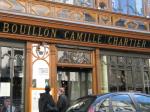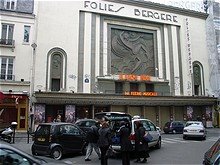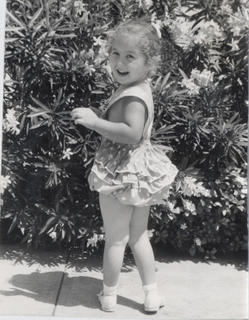Saturday, July 15, 2006
My Mother Was Right



Ooh, to have been seventeen going on fifty-nine...
MY MOTHER WAS RIGHT
BY GEORGINA MARRERO
Tais-toi! Ça suffit!
French. I knew it was French.
I couldn’t understand. I didn’t want to. At fifteen, however, I buckled. Two years of high school French later, my parents sent me to Tours.
Tours. It had to be Tours. That’s where my Hungarian-born mother had gone to study when she was sixteen. That was in 1929.
And in 1931, she’d gone to Paris, where she met my father. They married in 1940. My father took her to Cuba in 1941.
In 1972, she couldn’t request that application for me fast enough.
Landing at Orly in late June, I met her cousin and his wife for the very first time. I’d already met his brother in Toronto. I’d never seen so many Hungarians in one place in my entire Cuban-American life. They’d even had Hungarian restaurants there.
Otherwise, all I knew about Hungarians was that they had a strange language. A language my mother spoke on the phone from time to time in contorted tones, with otherworldly syllables. Even as a child I had deemed it “the language of the moon.”
Be sure to speak only in French, my mother admonished me. What else would I be able to speak with them, I wondered.
And whatever you do, don’t mention the war. And don’t mention the little cousin who had died. Don’t worry, mami, I’d told her.
With all these don’ts under my belt, it’s a wonder I could say anything. In my best French, I gave them a hug.
They said, “Goûte,” as they plied me with platefuls of pâtes, cornichons, and the best bread I’d ever tasted.
They always spoke French, even to each other. I couldn’t resist asking them if they ever spoke Hungarian.
Silence.
They drove me to Tours in their Citroën. I’d been so sure the little tinker toy they’d used to get around Paris was going to fall apart under our very eyes. Mercifully, it didn’t.
The Citroën, though: that was a big deal. More than anything, I was grateful for the legroom.
Settling in at the Cité Universitaire, I became immersed in my course work. Although I shuddered before the daily dictées, the professor seemed to be pleased with my progress.
Classes were in the morning, which left me with plenty of time for languorous lunches and the opportunity to meet fellow students. I made a special effort to also befriend the locals.
My mother was right, though I wouldn’t have admitted it to her then if my life depended on it.
For the Bastille Day celebrations, my relatives drove down in their Citroën to pick me up. All I remember is lying, curled up, sleepily watching fireworks from the back seat. They knew by then I didn’t trust the tinker toy.
French was taking over my life. They were amazed. They wrote my mother a letter about how well I was doing. They were pleased.
She was ecstatic.
At the end of the course, I decided I wanted to travel to Scotland. I called my parents.
Absolutely not, thundered my father. Ana, get over there and see what that girl’s up to. At age fifty-nine, my mother joined me in her Paris.
She showed me everything. She took me to the oldest restaurant: Le Procope; and the cheapest, Le Bouillon Chartier, where a waiter taught me how to eat an artichoke.
I insisted on Au Pied De Cochon. We warily trudged our way there one evening.
My mother was not pleased.
So, of course I had to balk at going to the Folies Bergère. In jeans, I insisted. How about a nice skirt? No.
After all, I was seventeen. I knew it all.
My mother, however, knew her Paris. So she kept trying. She wasn’t telling me anything I hadn’t heard all my life. Except that, this time, we were living it. Together.
At the beauty salon, my mother and her very best friend had a tête a tête. My godparents, who were also in town, wanted to go touring in Spain. What could she do? The peppy little Frenchwoman went on and on.
I’d learned a long time ago that Paris is very popular with Cubans.
And Cubans are very popular with Parisians.
Lucky for us, the Frenchwoman’s husband returned from the road trip early. The three of us went all around Montmartre, and ate some really good food we could all agree on. He helped me choose a pastel-hued artist’s proof that still hangs in my bedroom.
Another journey awaited me upon my return to the States: college. Almost placing out of French, I decided not to major in it.
My mother was not pleased.
When she passed away, I returned to Paris. Scatter her ashes in the Luxembourg Gardens, everyone advised me.
As I wasn’t completely sure, I arrived at Charles De Gaulle without them.
However, I visited her relatives. By then I knew my mother’s family had worn the Star of David on their clothing during the war. My father had been their daughter’s godfather. He knew his prayers in Latin, she said. I was amazed.
I also spent many wonderful hours reminiscing with the Frenchwoman’s widower. He remembered our Montmartre purchase. We made plans to return. Unfortunately, it never happened.
Within ten days, I switched channels: from BBC to LCI. I guess I remembered a thing or two.
My mother was right.
Copyright, 2005 by Georgina Marrero 895 words All rights reserved
